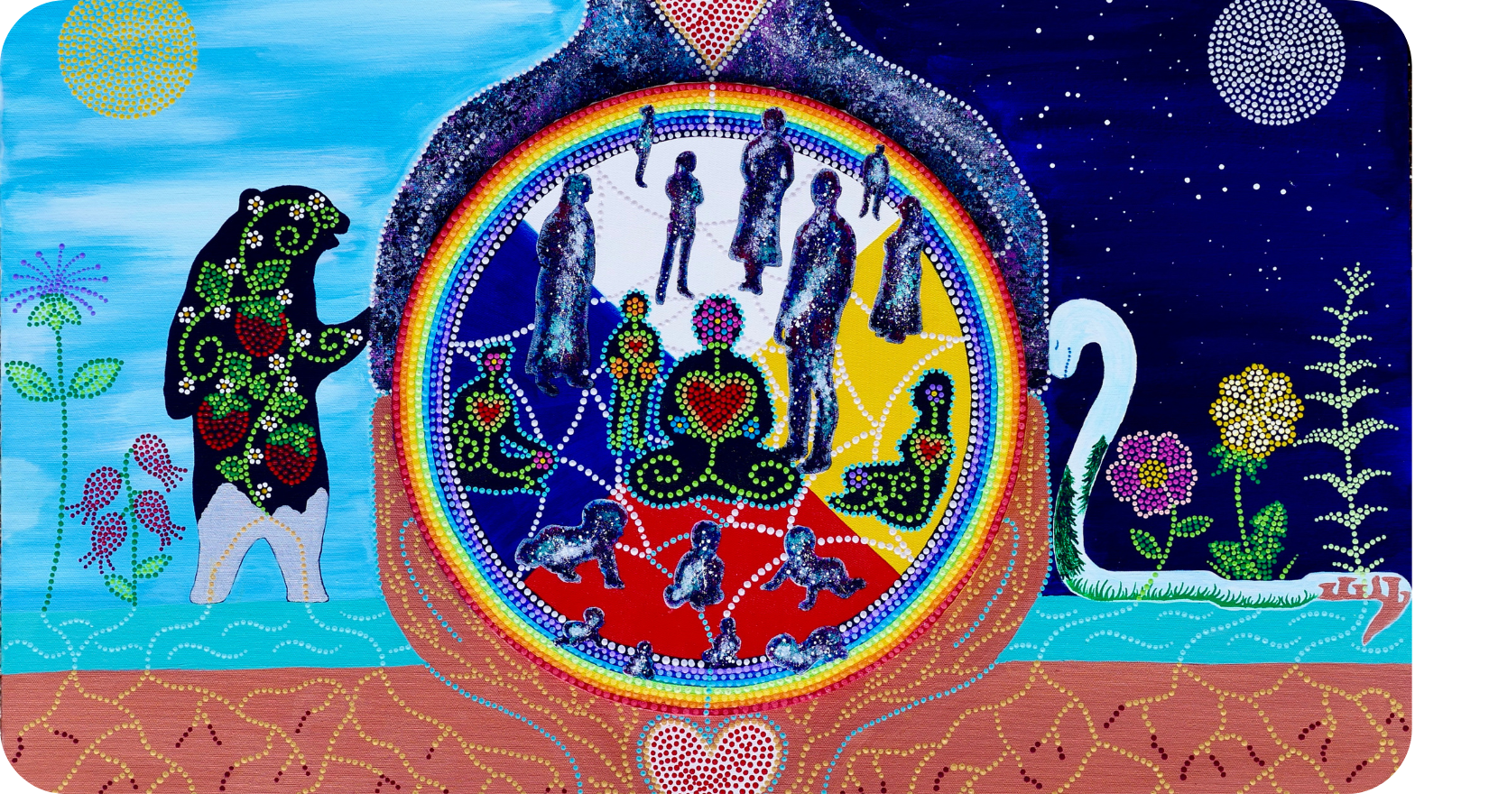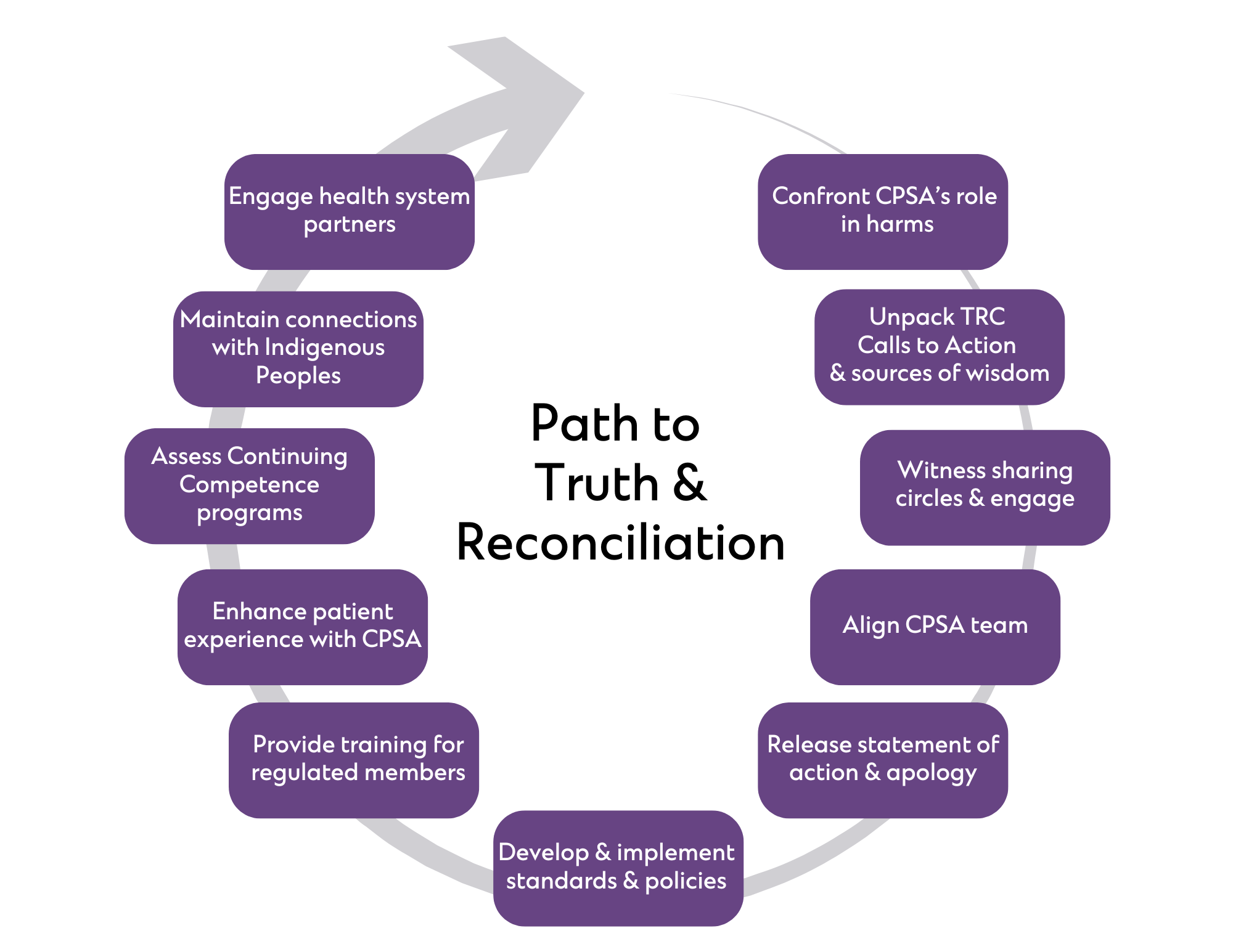Our action plan towards Truth and Reconciliation
We have heard from the Indigenous Advisory Circle, our partners and Indigenous leaders that many Indigenous people’s trust in the health system—including in CPSA and the physicians we regulate—has been broken. We understand it will take action from all parts of the health system to begin repairing trust.
The Path to Truth and Reconciliation demonstrates the actions CPSA will take—now and in the years ahead—to support culturally safe, high-quality and equitable health care for Indigenous people across Treaty 6, 7 and 8 territories. Along the way, we will seek ongoing input from First Nations, Métis and Inuit Peoples, regulated members, the CPSA team and our health system partners to make sure our efforts are impactful and sustainable.

ᓇᓇᑕᐃᐧᐦᐃᐁᐧᐃᐧᐣ ~ nanâtawihiwêwin ~ healing
by Cree/Métis artist Karlee Fellner
The actions
The Path is rooted in our mandate to serve and protect all people in Alberta, contributing to their health and wellness by supporting and guiding regulated members to provide safe, high-quality care. Given the health disparities and the 19.1-year gap in life expectancy affecting First Nations Peoples in Alberta, CPSA is deeply committed to walking this Path to help us carry out our mandate and contribute to the safe and equitable health care Indigenous people deserve.
The Indigenous Advisory Circle co-created the Path with us, identifying and supporting each of the actions outlined below. We’re grateful for their continued guidance as we move forward, taking to heart their advice on each step that we take together.

Confront CPSA’s role in harms and broken trust
What this will look like: complete a thorough review of archives and records to uncover the ways CPSA has contributed to harms to First Nations, Inuit and Métis Peoples
Our why: deeper understanding of ways CPSA has directly and indirectly contributed to harms and a clearer understanding of how we may earn trust in our organization
Unpack the Truth and Reconciliation Commission (TRC) Calls to Action and other sources of wisdom
What this will look like: review, analyze and assess the TRC Calls to Action, the United Nations Declaration on the Rights of Indigenous Peoples and other foundational documents, and incorporate learnings towards reconciliation
Our why: deeper understanding of and commitment to the actions CPSA may take to take towards reconciliation
Witness sharing circles and engage with First Nations, Métis and Inuit Peoples
What this will look like: listen to Nations, Settlements, communities, organizations and individuals to learn how broken trust with CPSA has been experienced by Indigenous Peoples in the past and today, understand barriers to accessing CPSA, and gain a deeper understanding of what is needed for safer healthcare experiences
Our why: more clarity around how CPSA may support improving cultural safety in healthcare interactions and remove barriers Indigenous people face in accessing CPSA
Align the CPSA team
What this will look like: engage the CPSA team in carrying out actions on the Path, provide training for CPSA Council and our team, review policies and processes to strengthen Indigenous inclusion, and develop appropriate supports for Indigenous people working in and with CPSA
Our why: CPSA-wide commitment and engagement in carrying out the Path
Release statement of action and apology
What this will look like: publicly acknowledge CPSA’s role in the experiences of and harms experienced by Indigenous people and state actions we will take to address the harms
Our why: public accountability for CPSA to make reportable progress on our commitments
Develop and implement standards and policies
What this will look like:
- Standards of Practice: outline and set professional and ethical expectations for regulated members in their interactions with Indigenous patients and colleagues
- Accreditation and Registration: assess and revise standards and policies
Our why: regulated members understand expectations of them, and standards and policies inform CPSA processes and practices
Provide training for regulated members
What this will look like: ensure regulated members have access to training and resources about culturally safe health care for Indigenous people
Our why: training and resources are aligned with the standard of practice and regulated members are supported in adhering to the standard
Enhance the patient experience with CPSA
What this will look like: assess and revise our processes to be culturally safe and accessible to Indigenous people
Our why: Indigenous people have culturally safe experiences with CPSA; CPSA is a more trusted resource for Indigenous people who have concerns about their healthcare experiences
Assess Continuing Competence programs
What this will look like: revise program expectations and materials to be culturally safe and support regulated members in providing Indigenous people with safe, high-quality care
Our why: regulated members have ongoing access to training and resources that support them in providing culturally safe care to Indigenous people
Maintain connections with Indigenous Peoples
What this will look like: establish regular connections with Elders, Nations, Settlements, communities, organizations and individuals
Our why: authentic relationships to invite ongoing feedback to support CPSA’s continued growth
Engage healthcare partners toward safer patient care
What this will look like: partner with other health profession regulators and healthcare organizations towards consistent and appropriate expectations for all healthcare professionals
Our why: healthcare partners share learnings towards system-wide improvement and work within their spheres of influence to ensure Indigenous people have a better experience within the healthcare system
How long will this work take?
CPSA is committed to walking this Path to Truth and Reconciliation and we recognize this will take time, effort and collaboration. Work is now underway and we anticipate this will be a multi-year effort, with outcomes that require our long-term commitment.
In taking action, we are also mindful of the priorities and capacity of our partners. We recognize that the work of CPSA is one of many demands on Indigenous Peoples. Our timelines will be flexible to respect the needs and expectations of the individuals, Nations, Settlements and organizations we collaborate with. Maintaining momentum is important, as is taking the right steps with continued guidance from the Indigenous Advisory Circle and Indigenous partners, learning from missteps, and continuing along this path.
Learn what drives CPSA to action >
Have questions?
Phone: 780-423-4764
Toll-free: 1-800-561-3899 (in Canada)




















